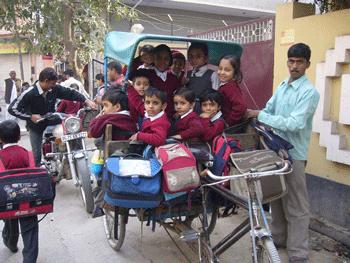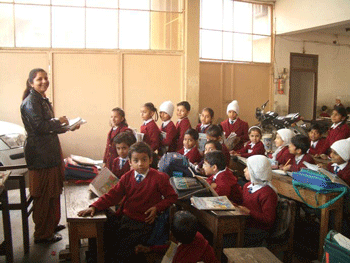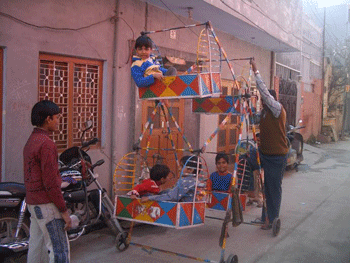1. The significance of ECCE
ECCE in India comes under the spotlight due to the following reasons. Firstly, more children under the age of five died in India than anywhere else in the world (1.83 million children as of 2008) (Save the Children), and approximately 46% of children under the age of three were found to be underweight (Kaul & Sankara, 2009). It is expected that India's ECCE programs that offer health and nutrition services will improve the physical conditions of young children and promote their development. Secondly, it is believed that ECCE will promote the intellectual and social development of young children, thus contributing to reducing the number of children dropping out at the stage of early education and improving the quality of early education programs. Thirdly, it is expected that setting up of ECCE centers for infants and toddlers will support not only the participation of women in the workforce but also the participation in education of poor children (especially girls) who babysit their young siblings.

2. ECCE providers and programs
In order to meet the diversified demands for ECCE, various organizations across public, private and non-governmental sectors are providing ECCE programs. In this section, I will briefly explain about these ECCE providers.
(1) Government organizationsThe Ministry of Women and Child Development (MWCD) plays a central role in ECCE activities in India. Since 1975, the MWCD has been providing free-of-charge integrated child development services (ICDS) in the areas of health, nutrition, and education to children in rural areas, minority groups, slums, and underdeveloped areas through ECCE centers called "Anganwadi" (meaning "courtyard shelter" in Hindi). By 2011, about 38 million people participated in ICDS education programs, and about 78 million people took part in health and nutrition programs at Anganwadi centers (MWCD, 2011), the largest numbers in the world.
Based on the positive results derived from an empirical study indicating the significance of ECCE in promoting universal elementary education*1, the Indian government has implemented initiatives using budgets for the elementary school universalization project, focusing on a smooth transition from preschool education to elementary education. These include the relocation of Anganwadi centers close to elementary schools and adoption of the same time schedule for commencing the class as that of elementary schools. Anganwadi centers also provide education on childcare and nutrition for infants and toddlers to 18.4 million women who are pregnant or breast-feeding mothers, in order to prevent detrimental effects of these mothers' poor health and literacy on the development of their babies (MWCD, 2011).
The ICDS provided at Anganwadi centers has been acclaimed for its contribution to extensively supporting the development of infants who suffer from poor health and malnutrition. However, it also received some criticism that the main targets of ICDS are only children aged between three and six, and those under three needing ICDS more urgently are likely to miss most of the services, and that it does not provide sufficient educational content (The World Bank, 2004).
(2) Non-government organizationsIn India, non-government organizations (NGOs) are established and run by individuals, religious organizations, and private companies. These NGOs provide ECCE programs as part of their social contribution activities for protecting the socially vulnerable. According to government estimates, approximately 3 to 20 million children participate in ECCE programs provided by NGOs (Kaul & Sankara, 2009). Some NGOs perform a complementary role to the government by providing ECCE programs in areas where the government cannot, while other NGOs are working in the spirit of entrepreneurship to improve the quality of ECCE provided by the government. Pratham, one of the NGOs, serves as a professional ECCE organization, by providing elementary school preparatory education for 90,000 children across 12 states in India, while conducting ECCE research and surveys, and providing training for Anganwadi teachers.
(3) Private Educational InstitutionsAgainst the backdrop of active educational investment along with rising household income in India, the number of private schools is rapidly increasing in every stage of education. According to government estimates, about 10 million children participate in ECCE programs provided by private organizations, although the actual number is uncertain as the government does not organize and regulate these educational activities (Kaul & Sankara, 2009). Some of these organizations are private schools that provide ECCE programs through to upper-secondary education targeting children from elite and middle-class families, or provide only ECCE programs for children of poor families, or low-fee schooling through to elementary education. There are also some private preschool franchises including Euro Kids (780 branches across 280 cities) and Kidzee (550 branches across 210 cities), both of which are offering services overseas (e.g., South and Southeast Asia and the Middle East).

There is general recognition among parents in India that private schools using English as the primary medium of instruction (so-called "English-medium public schools") provide a better quality of education than those that uses local languages in teaching. It is reported that even some children of poor families whose parents can afford to pay a certain tuition fee attend the English-medium public school.
Unlike elementary and secondary education, ECCE programs are not regulated or standardized by the government. Therefore, there is a large discrepancy in the ways in which ECCE providers deal with curricula, education quality, and teachers' qualifications. The majority of ECCE programs provided by private educational institutions are unofficial education programs without the government's supervision and instruction, and these are gradually expanding due to an increasing interest among parents in ECCE.
3. The current status of teacher training and recruitment
There is no legal framework that specifies requirements and standards of ECCE teacher training programs in India; instead various education channels provide different types of training. Some higher education institutions implement the Nursery Teachers Training (NTT) program (two-year training for preschool teachers) approved by the National Council for Teacher Education (NCTE). The diploma granted to teachers who completed the NTT program is considered as an essential qualification for teaching in some public schools and government-run preschools. There are also online ECCE teacher training programs offered by online educational institutions. For example, the Indira Gandhi National Open University (IGNOU) offers a two-year diploma course for those who complete upper-secondary education (Grade 12; equivalent to the third year of high school in Japan), and the National Institute of Open Schooling (NIOS), a one-year certificate course for those who complete lower-secondary education (Grade 10; equivalent to the first year of high school in Japan). The ECCE teacher training course is also included in the curriculum of regular schools at the stage of upper-secondary education as "vocational education." The above training courses require a relatively long time to complete, while the teacher training course offered at Anganwadi centers takes only two weeks.
Most teachers working at Anganwadi centers, NGOs, and private preschools are those with little training without any teaching qualifications, and thus hired for a low salary*2. The majority of these teachers are women due to a social norm that women are more capable of looking after infants and toddlers. Some criticize that women nursery teachers are being exploited by school owners who take advantage of the absence of laws regulating the treatment of teachers, while others say that these educational facilities provide employment opportunities for women who have no teaching qualification.
4. Establishment of legal frameworks for ECCE and future outlook
In 2010, the Indian government enacted the Right to Education Act (RTE Act) in order to ensure universal access to elementary education for all children. It clarifies that every child in the six to fourteen age group (stage of primary education) has a basic right to receive free elementary education, and the government has the obligation to provide such education to these children. Although children under the age six are outside the scope of the "basic right to education," the RTE Act directs that "with a view to prepare children above the age of three years for elementary education and to provide early childhood care and education for all children until they complete the age of six years, the government may make necessary arrangements for providing free pre-school education for such children" (Section 11). Currently, the government is working to set up a one-year ECCE course at all government-run schools in Delhi.
In addition, reflecting political commitments for addressing children's rights, the MWCD proposed in 2012 the "National ECCE Policy," "National Early Childhood Education Curriculum" and "Quality Standards for ECCE," in order to improve the government's stance of non-interference regarding ECCE and to ensure equal access to ECCE and quality. The policy describes the government's initiatives for establishing ECCE legal frameworks, such as the establishment of "National ECCE Council" to be the apex body to guide and oversee ECCE programs; establishment of state-level policy frameworks as well as legal frameworks to implement such policies; the formulation of a license registration system and set-up and management standards for the system; the strengthening of monitoring, research, evaluation and teacher training functions. Furthermore, the MWCD provides practical guidelines including curriculum policies applicable to all ECCE programs, teaching methods, materials and planning of education programs for each developmental stage of infants and toddlers (MWCD, 2012a, 2012b, 2012c). Moving forward, we should carefully observe how ECCE will change along with the government's efforts towards the development of ECCE legal frameworks.

*1: Some previous studies on India's ECCE have suggested that children who received preschool education are more likely to continue elementary education (NCERT, 1993) and have better abilities of writing, sound recognition, object matching and classification (NIPCCD, 2006) compared to those who did not.
*2: Salaries of teachers working at preschools vary depending on schools. I have conducted a survey targeting preschool teachers in underdeveloped areas in Delhi and found out that the average monthly salary is 1,500-2,000 rupees (equivalent to 24.5-32.5 USD), which is only one-tenth of the average monthly salary of teachers working at official elementary schools.
References
Government of India, Ministry of Law and Justice, Legislative Department (2009) The Right of Children to Free and Compulsory Education Act, 2009. http://eoc.du.ac.in/RTE%20-%20notified.pdf
Kaul, V. and Sankara, D. (2009) Education for All, Mid Decade Assessment, Early Childhood Care and Education in India, National University of Educational Planning and Administration. http://www.educationforallinindia.com/early-childhood-care-and-education-in-india-1.pdf
Ministry of Women and Child Development (MWCD) (2006) Early Childhood Education in the Eleventh Five Year Plan (2007-2012) http://wcd.nic.in/wgearlychild.pdf
MWCD (2011) Report of the Working Group on Child Rights for the 12th Five Year Plan http://planningcommission.nic.in/aboutus/committee/wrkgrp12/wcd/wgrep_child.pdf
MWCD (2012a) Early Childhood Education Curriculum Framework (Draft) http://wcd.nic.in/schemes/ECCE/curriclum_draft_5[1]%20(1)%20(9).pdf
MWCD (2012b) Draft National Early Childhood Car and Education (ECCE) Policy http://wcd.nic.in/schemes/ECCE/National%20ECCE%20Policy%20draft%20(1).pdf
MWCD (2012c) Quality Standards for ECCE (Draft) http://wcd.nic.in/schemes/ECCE/Quality_Standards_for_ECCE3%20(7).pdf
National Council of Educational Research and Training (NCERT) (1993) Impact of ECE on Retention in Primary Grades - A Longitudinal Study, New Delhi: NCERT.
National Institute of Public Cooperation and Child Development (NIPCCD) (2006) Select Issues Concerning ECCE India, Background Paper Prepared for the Education for All Global Monitoring Report 2007 Strong Foundations: Early Childhood Care and Education, http://unesdoc.unesco.org/images/0014/001474/147474e.pdf
Save the Children, Child Mortality in India http://www.savethechildren.in/87-news-releases/130-child-mortality-in-india.html
The World Bank (2004) Reaching out to the Child, An Integrated Approach to Child Development, New Delhi: Oxford University Press.














